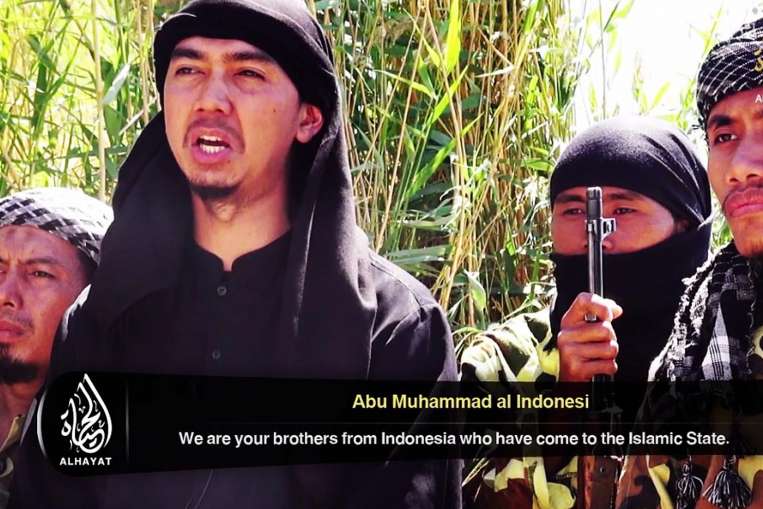
A group of Indonesian men in a recruitment video released by the Islamic State in Iraq and Syria, urging Indonesian Muslims to join the militants’ fight. Research by TSG shows “at least 600 South-east Asians fighting in Syria”. The sheer number of people coming from Indonesia and Malaysia has led to the formation within ISIS of a South-east Asian unit called the Katibah Nusantara.PHOTO: YOUTUBE
The first Indonesians who travelled to Syria to join the Islamic State in Iraq and Syria (ISIS) were already in the Middle East on student visas, often sponsored by Islamic radical groups back home.
But those from Malaysia and Singapore arrested in their countries before they could leave for Syria largely had no prior association with extremist groups. Some even appeared to be motivated by a desire to be good Muslims and had a romanticized idea of an Islamic caliphate.
These are some of the key findings in a report released on Dec. 8, 2015 by New York-based security consulting firm The Soufan Group (TSG), aimed at assessing the flow of foreign fighters into ISIS. It estimates between 27,000 and 31,000 people from at least 86 countries, including Asian nations such as China, Japan and the Philippines, have travelled to Syria or Iraq to join ISIS.
This is more than double the 12,000 foreign fighters first identified in June last year. “The increase is evidence that efforts to contain the flow of foreign recruits to extremist groups in Syria and Iraq have had limited impact,” said TSG.
Earlier estimates from security agencies in Indonesia, Malaysia, Singapore and the Philippines show at least 900 from all four countries have travelled to join ISIS in Syria.
The largest group, about 700, is from Indonesia while Malaysia and the Philippines each have about 100 citizens suspected to have made the journey.
Research by TSG, however, shows a lower figure of “at least 600 South-east Asians fighting in Syria.” Still, the sheer number of people coming from Indonesia and Malaysia has led to the formation within ISIS of a Southeast Asian unit called the Katibah Nusantara, added TSG.
Contributors to the report, who include TSG chief executive and former Federal Bureau of Investigation agent Ali Soufan, said personal accounts from fighters indicate a great majority of ISIS recruits go to Syria intending to fight there rather than to train to become terrorists back home. “But the attacks in Paris on Nov 13 may reflect a growing trend of overseas terrorism being planned and organized from the Islamic State,” said the report.
TSG’s figures show that 2,778 ISIS recruits from the 86 countries have since returned home from the Middle East.
Indonesia’s National Intelligence Agency is tracking at least 100 citizens said to have returned from the Middle East after joining ISIS, while the country’s counter-terrorism unit Detachment 88 has been running surveillance on 60 to 70 of these returnees to date.
“If you go back to the history of terrorism in Southeast Asia, you will see individuals going earlier on to fight in Afghanistan,” Mr. Soufan told The Straits Times on Tuesday. “Their goal was not to die in Afghanistan but they wanted to come back to start a jihad in Southeast Asia.”
Mr. Soufan was referring to sympathizers from the region who fought alongside the mujahideen against the Soviets in Afghanistan or Pakistan and returned to set up militant groups such as Jemaah Islamiah.
Today, ISIS has a far wider reach, thanks to the Internet, where it has used social media both to sow fear among its enemies and to entice alienated Muslims to “immigrate” to ISIS-controlled territory and join their cause. Mr. Soufan said ISIS has used social media to create inspiration, which can have a deadly effect.
“It is a blessing and a curse, a blessing because they don’t have clusters of terrorist recruiters in America’s ghettos,” he said. “But it’s a curse because I’m now not only worried about the people who travel to Syria, I’m worried about the people who actually do not travel and decide to stay home.”
Since July last year, ISIS has posted propaganda and recruitment videos online aimed at persuading Indonesians and Malaysians to immigrate to Syria with their families. “One video showed Malay-speaking children training with weapons in Islamic State-held territory while two Malaysians were featured in another Islamic State video of the beheading of a Syrian man,” said TSG.
Meanwhile, Indonesia has boosted security as it held polls at a provincial level nationwide on Wednesday and will celebrate Christmas and New Year’s Eve in the weeks ahead. The move follows threats from ISIS to launch strikes globally, with domestic group East Indonesia Mujahidin pledging to do the same at home.
RELATED STORIES
Military hunting down Singaporean, Malaysian terrorists in Mindanao
Malaysia, US bolster cooperation to fight terrorism

